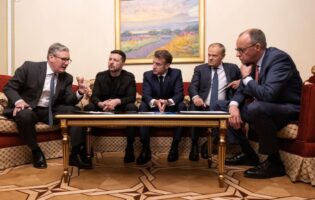Lessons for Others? International Perspectives on the Franco-German Relationship 50 Years after the Elysee Treaty
The Center for Transatlantic Relations
and the American-German Institute (AGI)
cordially invite you to
Lessons for Others?
International Perspectives on the Franco-German Relationship
50 Years after the Elysee Treaty
Thursday, November 14, 2013
8:30 AM – 4:00 PM
Kenney Auditorium
1740 Massachusetts Avenue NW
Washington, DC 20036
In 2013 Germany and France are commemorating the 50th anniversary of the Elysée Treaty, which has been a cornerstone of their bilateral reconciliation and partnership following a long period of hostility and tragedy. This conference will engage international experts and opinion leaders to explore lessons learned, good practices, challenges and opportunities that may be drawn from the Franco-German relationship and applied to other bilateral relationships around the world, as well as how the Franco-German tandem has influenced others’ perceptions of the roles of France and Germany in Europe and the world.
8:30 Welcome (coffee and a light breakfast provided)
9.00 Session I. An Ethic for Enemies? What Lessons Might French-German Efforts at Reconciliation Offer to Other Sensitive Bilateral Relations?
How have efforts at mutual reconciliation, including joint educational and history textbook initiatives, as well as youth and professional exchange programs, influenced the perceptions and attitudes of Germans and French towards each other, their history and their future? What successes, limitations and challenges do third country experts find in the German-French experience that may be of relevance to other troubled relations, for instance Israelis and Palestinians, Japanese and Chinese or Koreans, Hungarians and Romanians, Greeks and Turks, Poles and Russians?
- France/Germany — Antoine Vion, Aix-Marseille University
- Poland-Russia — Matt Rojansky, Woodrow Wilson Center for Scholars
- Middle East – Raymond Cohen, Hebrew University
- Asia — Daqing Yang, George Washington University
10:30 Session II. Bound Together: Enhancing Security and Prosperity Through Economic Integration
Both the Elysee Treaty and the European Union process enhanced France and Germany’s economic integration and development. Not only have both countries bound inextricably together their respective economic instruments of war, they have forged significant joint industrial enterprises, adopted a common currency, and recently pledged to abide by common fiscal rules. Yet many cultural differences remain, economic perspectives often diverge, and new competitive challenges could pull each economy in different directions. The underlying premise of these efforts has been that deeper economic integration can enhance both mutual security and mutual prosperity. How relevant is this premise in the 21st century as each country strives to be competitive and innovative in a more global economy? What lessons does Franco-German experience offer to third countries, and how do third country observers view the impact of deep French-German economic integration?
- France/Germany — Jean-Francois Boittin, Economic Counselor, French Treasury
- Central-Eastern Europe-Russia – Tamas Novak, Center for Transatlantic Relations
- Middle East – Zubair Iqbal, Middle East Institute
12.00 pm Lunch (provided)
12:45 Session III. Common Security: What can Third Parties Learn, What should they Avoid?
France and Germany have very different security traditions and perspectives. They have sought, with varying success, to integrate military units and forge common approaches to mutual security challenges. Where have such efforts been successful, and why? Where has progress been difficult? How do other allies and partners view such efforts, and what might those efforts mean for third parties outside the traditional EU/NATO framework? Both countries have also advanced the proposition that mutual security is enhanced through open borders. What used to be the most militarized borders in the world are now the most open. What arrangements enable both countries to maintain open borders and encourage the free flow of labor while ensuring security and coping with significant movements of people? What lessons does this experience offer for other countries? What are the challenges and pitfalls?
- France/Germany – Steven Kramer, National Defense University
- Central/Eastern Europe – Jan Jires, Ministry of Defense of the Czech Republic
- Middle East — Ayse Kadayifci-Orellana, American University
- Asia — Jae-Jung Suh, SAIS
2:15 Session IV. The Role of Political Leadership
Although the bilateral relationship has had its ups and downs, the Franco-German tandem has been the motor of European integration; the eurozone crisis has only reinforced this dynamic. At times, the particular constellation of leadership has been decisive; at other times bilateral leadership ties have been fraught. How important is political leadership? How relevant might it be to other powers as they consider their own bilateral relationships? In what ways?
- France/Germany — Lily Gardner Feldman, AGI
- Central-Eastern Europe – Stephen Larrabee, RAND Corporation
- Middle East — David Witzthum, Israel
- Asia – Lanxin Xiang, Transatlantic Academy
3:45 pm Concluding remarks
4:00 pm Conference ends
*Invited
We would like to thank the Embassy of France and the Embassy of Germany for their support for this conference.






